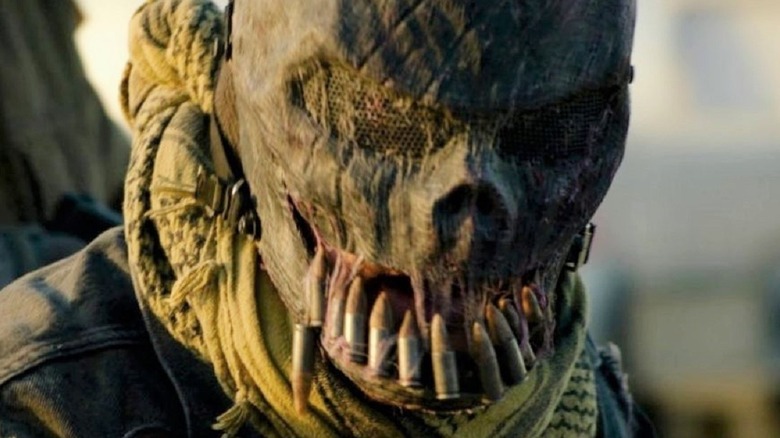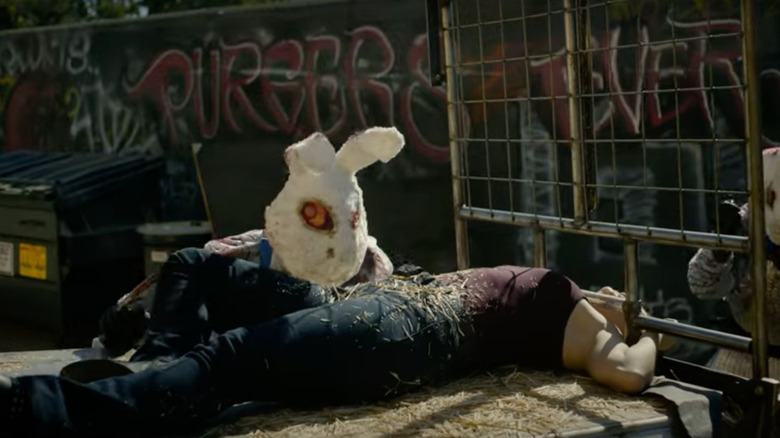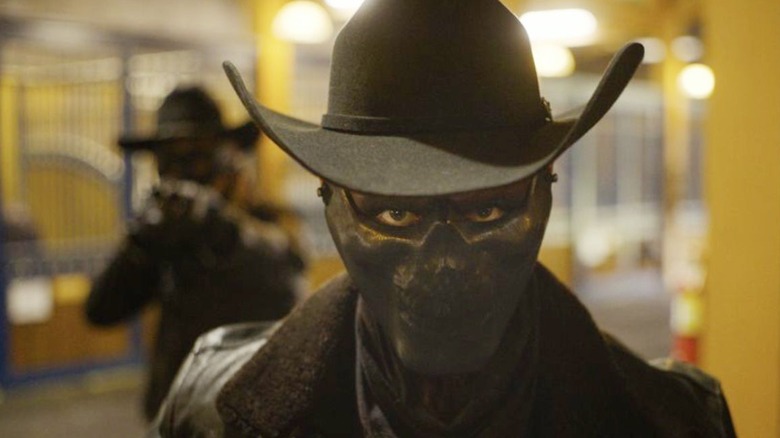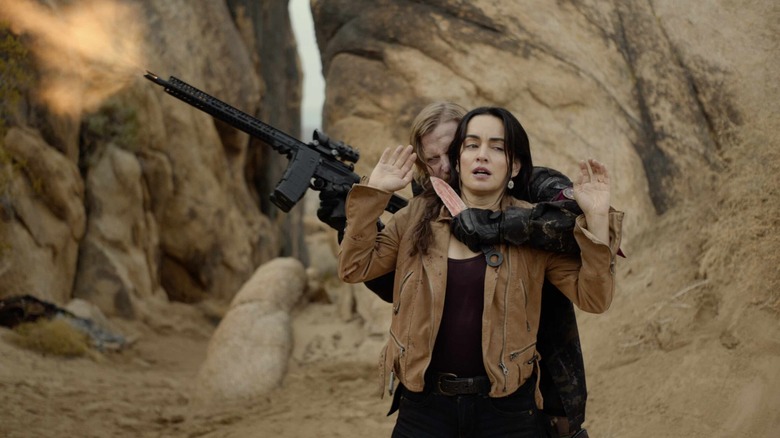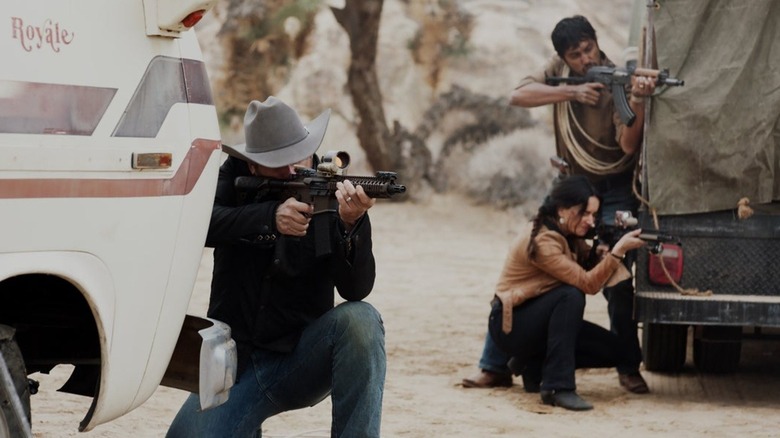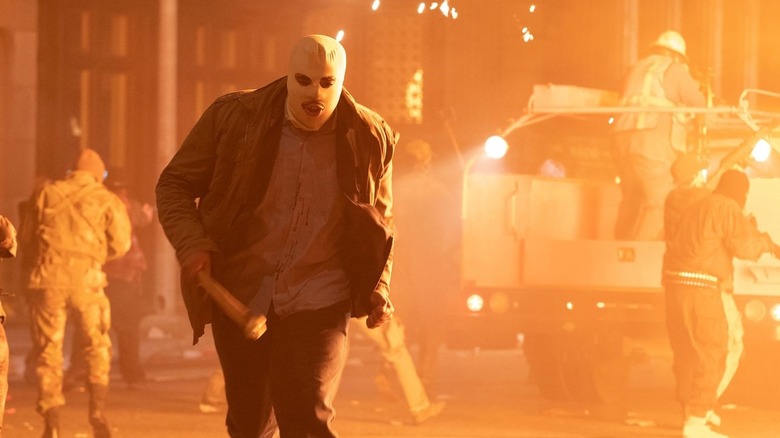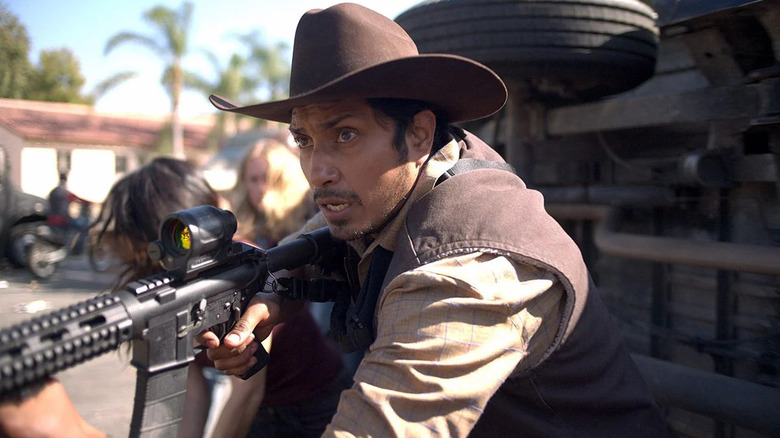The Ending Of The Forever Purge Explained
When it was being created, "The Forever Purge" was conceived as the last film in a horror franchise that now spans five theatrical releases and a TV series with two seasons to its name already. While it's struggled with the execution, the series has a genius concept: One night a year, all crime is legal. And as the series has gone on, it's leaned more directly into political and social commentary. "Election Year" was made in the wake of the 2016 election, with Clinton and Trump stand-ins to boot. And "The First Purge," a prequel that took us back to the beginning, saw the government sending white supremacists into a peaceful Black neighborhood to instigate violence and prove the Purge is worth continuing.
"The Forever Purge" is ostensibly the opposite. It's a final Purge, when supremacists and extremists join forces to continue the annual nightly event into the following day and beyond ... until they've driven out all immigrants from America. The movie follows Juan (Tenoch Huerta) and Adela (Ana de la Reguera from "Army of the Dead"), an immigrant couple from Mexico, led by their white boss, Dylan (Josh Lucas), and his pregnant wife, Cassie (Cassidy Freeman), on a race to the Mexican border to escape a nation that won't stop purging.
This latest entry is as political as the series has ever been, even if some say its message is ultimately muddled and shallow. Still, there's a lot of subtext going on in the final 10 minutes of the film. And "Purge" fans certainly want to know where the franchise could possibly head after the world-changing ending of "The Forever Purge." So, if you want some answers, keep on reading — although, beware of spoilers for both the movie and the series as a whole.
Who survives the Forever Purge?
So, let's discuss what actually happens at the end of "The Forever Purge" before getting into the nitty-gritty details of what it all means. In the film's climactic battle, tribal leader Chiago leads our rag-tag group of heroes across the Mexican border as both sides arm up for a fight. And ever since the group killed his mother earlier in the film, white supremacist and Purger Dalton (Joshua Dov) and his small army of allies have been chasing our heroes down to the border. Backed into a corner, the good guys have no choice but to stop running and fight back.
During the massive shootout that ensues, Chiago (Gregory Zaragoza) rushes Cassie and the other survivors across as Juan, Adela, and Dylan try their best to hold off the onslaught. Minutes later, Dalton and another Purger corner Adela and Dylan, and they seem to have the upper hand. When it's nearly too late, Juan uses his Chekov's lasso in a final moment of bravery to save his wife before putting Dalton down with a bullet through his skull.
The remaining heroes then make it across the border uninjured, and they're even greeted with cheery news. Cassie's labor was a success, and Dylan is rewarded for his racist remarks and questionable morality with a beautiful new baby. All's well that ends well, at least for Juan and Adela, as they ultimately made it back home.
"The Purge" movies are brutal, and in the grand tradition of horror, the characters you grow to love often get killed off in gory ways. So it's a miracle that all the main characters of "The Forever Purge" are alive at the end with something to celebrate. But for the rest of America, we see that the future may not be so bright.
What happens to America after The Forever Purge?
At the very end of the film, we get a shockingly uplifting ending for a "Purge" movie. Everyone worth saving makes it out safe and across the Mexican border. Cassie ends up having a healthy baby and survives to raise the child (lets assume for a little while at least). Juan and Adela make it back home, and for them, it's the happiest ending of all because they don't have to go back to America. But turn your attention to the "once great" nation, and you begin to see the movie's cynical side.
The final shot zooms out to show the United States of America on fire. Radio chatter plays that implies a conflict, saying that people are beginning to fight back against their aggressors. It's unclear how much time has passed between the beginning of the Forever Purge and this broadcast, but it can be assumed at least some passage of time has occurred. The future of the U.S. is left ambiguous, but the extremists who organized this great Purge are still out there and still killing and destroying. In this sense, the ending of "The Forever Purge" is also extremely dark and leaves the audience unsure where the franchise can go from here. The state of the nation is one of civil war — an inevitable end result of the government social experiment that began the annual Purge.
Why did Juan lasso Dalton?
During the final struggle between himself, Adela, and Dalton, Juan disarms the vengeful mercenary who chased them down, using the lasso he's been carrying suspiciously for the entire movie's runtime. Wrapping the lasso around his neck, Juan drags him through the sand before putting a bullet through Dalton's head. This whole charade raises a question — if Juan had a gun and a clean angle on the man about to kill his wife, why didn't he just shoot him right then and there?
Well, that would be missing the symbolism of this moment and, by extension, one of the points "The Forever Purge" is trying to make. The theme of redemption and retribution runs strong in this moment and brings to mind America's history of lynching African-Americans. Tragically, the same exact thing also happened to many Latino people during the same time period. This violent scene of a person of color capturing a white supremacist with a noose and then shooting him is a cathartic moment of role reversal.
And aside from being a horror movie, "The Forever Purge" also takes a lot of influence from the Western genre. This type of lasso maneuver is a staple of the Westerns that "The Forever Purge" is so lovingly referencing.
Why is crossing the border so important?
By the time we're introduced to all the protagonists of "The Forever Purge," the plot sets off in the direction of the border. Juan and Adela's current home is in Texas already, so Mexico isn't very far away, and the four characters head to the town of El Paso, where all border-crossing becomes legal and uninterrupted for the next six hours. But by the time they reach the border, it's heavily guarded, and our heroes must face off against the militarized Purgers in a climactic battle to fight their way into Mexico. But if safe passage is no longer viable, why go?
This has a lot to do with the characters and their deep-rooted motivations. Juan and Adela want to return to their homeland across the border. Driven by the fear of being in a violent warring country that hates them, they see no choice anymore. Dylan, too, is backed into a corner. With a pregnant wife about to go into labor, he decides to step up and be a leader, despite having no love for the country he's leading an army into or its people. Still, it's important for them to cross for the ending to work. But why is that?
Well, the final overt political message of "The Forever Purge" is a call for empathy — to imagine you're in someone else's shoes. The crossing of Americans into Mexico is a symbol of this theme, and the ending suggests both Canada and Mexico provided enough aid to American refugees for them to begin to recapture their fallen country.
Will there be any more Purge movies?
While it was originally announced to be the final "Purge" movie, "The Forever Purge" might not actually be the grand finale of the series. After all, the ending definitely leaves room for more interesting stories to be told. It seems like series creator and screenwriter for all the films, James DeMonaco, is actually working on the idea for the next "Purge" movie, even if the story is only in early stages.
"If you asked me this four months ago, I probably would have said it was the end," DeMonaco said in an IGN interview. "And then I woke up, for better or worse, with a new idea three-and-a-half months ago, and I pitched it to everyone, and I think it's another way to flip it. It would be taking America in a new direction. If they wanted it, that is. If the audience wants it, we'll be ready to give it. But they have to tell us they want it before we go ahead."
And honestly, it makes a lot of sense to keep the story going. While critics are divided on the film, "The Forever Purge" has been described as "largely — albeit bluntly — effective," implying that the films can keep on getting better and better. And considering their tiny budgets, the movies make quite a bit of cash. Plus, when you have a series that's as political as this one, you can use it to comment on all sorts of social issues, which means the "Purge" movies could keep the terror going for quite some time.
Where else can the Purge franchise go from here?
The "Purge" movie franchise has never broken from its internal continuity. After ending the fifth film on a radio message detailing Americans fighting back, this civil war type story could be DeMonaco's idea for the next film. That certainly makes more sense than if he were to make a spinoff or break from the established continuity of the previous movies. But you never know — a time skip can be a useful tool in making stale franchises feel fresh again.
There's also "The Purge" TV show that aired for two seasons on USA. The anthology series was not well received by critics, and the fanfare was never loud enough to make it a part of the cultural conversation. After a second season that most people seeing "The Forever Purge" probably don't even know exists, "The Purge" USA show was canceled, and it doesn't show any signs of being revived.
Of course, the concept of "The Purge" is so malleable that it would be wonderful to see the series in the hands of someone other than DeMonaco. The creator has remained extremely hands-on with every property, even after giving up directorial duties following "Election Year." It's a still novel conceit, and it would be great to see the property in the fans of other creators in the form of new movies or on TV. Seriously, could you imagine if someone like Jordan Peele, Karyn Kusama, or Jeremy Saulnier took a crack at running the franchise?
Having said, DeMonaco has given us a film that — despite its flaws — is visceral, scary, and pretty powerful. Heather Dixon of Daily Dead said, "DeMonaco taps into the sociopolitical undercurrent that has been rippling throughout the United States for the last decade or so," and Rebecca Murray of Showbiz Junkies writes, "DeMonaco has taken the gloves off. This is a brutal, unflinching condemnation of racism told without any filters." So even if DeMonaco continues to guide the series, it means the future is full of fantastic — and frightening — possibilities.
